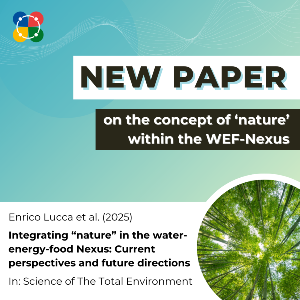New Paper: Rethinking the Water-Energy-Food Nexus
13 Feb 2025
Lucca et al. (2025): Integrating “nature” in the water-energy-food Nexus: Current perspectives and future directions. In: Science of The Total Environment
13 Feb 2025
Lucca et al. (2025): Integrating “nature” in the water-energy-food Nexus: Current perspectives and future directions. In: Science of The Total Environment

The 𝗪𝗮𝘁𝗲𝗿-𝗘𝗻𝗲𝗿𝗴𝘆-𝗙𝗼𝗼𝗱 (𝗪𝗘𝗙) 𝗡𝗲𝘅𝘂𝘀 is a widely used framework to understand how these three critical sectors interact. But there's a missing piece in many discussions: 𝗻𝗮𝘁𝘂𝗿𝗲. Without functioning ecosystems, there is no clean water, no fertile soil for food, and no sustainable energy sources.
A new paper by Enrico Lucca et al., co-authored by Prof. Dr. Marianela Fader, makes a crucial argument: nature isn’t just a background variable in the WEF Nexus—it actively sustains, regulates, and is impacted by these systems, and must therefore be fully integrated into Nexus thinking.
The research, published in Science of the Total Environment (STOTEN), finds that while many researchers include the concept of nature in their articles, there are different ways to approach it:
𝗧𝗵𝗲 𝗮𝘂𝘁𝗵𝗼𝗿𝘀’ 𝘀𝘂𝗴𝗴𝗲𝘀𝘁𝗶𝗼𝗻: 𝗔 𝗛𝘆𝗯𝗿𝗶𝗱 𝗔𝗽𝗽𝗿𝗼𝗮𝗰𝗵
The authors propose a 𝗵𝘆𝗯𝗿𝗶𝗱 𝗺𝗼𝗱𝗲𝗹 that integrates ecosystems as both a distinct component and a foundational layer within the WEF Nexus while embedding it in broader social-ecological systems (SES). This 𝗵𝗼𝗹𝗶𝘀𝘁𝗶𝗰 𝗮𝗽𝗽𝗿𝗼𝗮𝗰𝗵 reduces fragmentation, allows 𝗺𝘂𝗹𝘁𝗶-𝗹𝗮𝘆𝗲𝗿𝗲𝗱 𝗮𝗻𝗮𝗹𝘆𝘀𝗶𝘀, and aligns with frameworks like One Health. Though adaptive, it requires 𝗶𝗻𝘁𝗲𝗿𝗱𝗶𝘀𝗰𝗶𝗽𝗹𝗶𝗻𝗮𝗿𝘆 𝗰𝗼𝗹𝗹𝗮𝗯𝗼𝗿𝗮𝘁𝗶𝗼𝗻 𝗮𝗻𝗱 𝗽𝗼𝗹𝗶𝗰𝘆 𝗰𝗼𝗵𝗲𝗿𝗲𝗻𝗰𝗲 for effective implementation.
This paper is the result of 𝟮.𝟱 𝘆𝗲𝗮𝗿𝘀 𝗼𝗳 𝗰𝗼-𝗱𝗲𝘃𝗲𝗹𝗼𝗽𝗺𝗲𝗻𝘁 and provides a conceptual roadmap for researchers, policymakers, and practitioners to 𝗿𝗲𝘁𝗵𝗶𝗻𝗸 𝘀𝘂𝘀𝘁𝗮𝗶𝗻𝗮𝗯𝗶𝗹𝗶𝘁𝘆 𝘀𝘁𝗿𝗮𝘁𝗲𝗴𝗶𝗲𝘀 that consider both human and ecological needs.